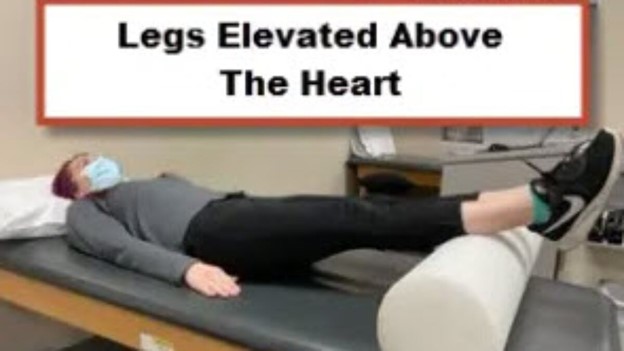A nurse is reinforcing teaching with a parent of a child who has a sprained wrist. Which of the following interventions should the nurse instruct the parent to implement during the first 12 to 24 hours to minimize swelling?
Encourage active range of motion of the extremity.
Apply warm compresses to the extremity.
Elevate the extremity above the level of the heart.
Wrap the extremity loosely with an elastic bandage.
The Correct Answer is C
Choice A rationale:
Encouraging active range of motion of the extremity is not recommended during the first 12 to 24 hours after a sprained wrist. Early movement can potentially worsen the swelling and delay the healing process.
Choice B rationale:
Applying warm compresses to the extremity is not the best choice to minimize swelling in the initial 12 to 24 hours after a sprained wrist. Heat can actually increase blood flow and promote more swelling in the injured area.
Choice C rationale:
Elevating the extremity above the level of the heart is the correct choice for minimizing swelling in the first 12 to 24 hours after a sprained wrist. Elevating the injured area helps to reduce blood flow to the area, which in turn decreases swelling and promotes healing.

Choice D rationale:
Wrapping the extremity loosely with an elastic bandage might be beneficial for providing support, but it's not the primary intervention for minimizing swelling in the first 12 to 24 hours after a sprained wrist. Elevation is more effective for reducing swelling during this initial period.
Nursing Test Bank
Naxlex Comprehensive Predictor Exams
Related Questions
Correct Answer is B
Explanation
Choice A rationale:
Decrease daily oral fluid intake. Rationale: This choice is not appropriate for a client experiencing a vaso-occlusive crisis in sickle cell anemia. In this crisis, there is a risk of dehydration due to increased fluid loss, and decreasing oral fluid intake would exacerbate this issue. Adequate hydration is important to prevent further sickling of red blood cells and maintain organ perfusion.
Choice B rationale:
Maintain bed rest to prevent hypoxemia. Rationale: This is the correct choice. During a vaso-occlusive crisis in sickle cell anemia, blood flow to certain tissues is restricted, leading to tissue hypoxia and pain. Bed rest is recommended to reduce metabolic demands and oxygen consumption, helping to prevent further tissue damage and improve oxygenation. It also reduces the risk of complications such as thrombosis and respiratory compromise.
Choice C rationale:
Apply cold compresses to painful joints. Rationale: Applying cold compresses is not a recommended intervention for vaso-occlusive crisis in sickle cell anemia. Cold can exacerbate vasoconstriction and further compromise blood flow to the affected tissues. Warm compresses or warm baths might be more appropriate to promote vasodilation and alleviate pain.
Choice D rationale:
Administer meperidine to eliminate a fever. Rationale: Administering meperidine solely to eliminate a fever is not the primary focus of care for a vaso-occlusive crisis. The priority is to manage pain and improve tissue perfusion. Meperidine is an opioid analgesic that can be used to manage severe pain associated with sickle cell crises, but it should be given with caution due to the risk of respiratory depression and the potential for addiction.
Correct Answer is C
Explanation
Choice A rationale:
A 2 cm scalp laceration, while a concern, is not the nurse's priority in this scenario. The child's head injury could potentially be serious, but priority should be given to neurological assessments and signs of increased intracranial pressure.
Choice B rationale:
Nasal discharge negative for glucose is not indicative of a major issue in this context. While cerebrospinal fluid (CSF) leaking from the nose after head trauma is a concern, it is not mentioned in this scenario, and this choice does not take precedence over other neurological signs.
Choice C rationale:
This is the correct answer. Asymmetric pupils can be a sign of a serious neurological issue, such as a brain injury or increased intracranial pressure. It requires immediate attention and further evaluation to assess the child's neurological status and determine the extent of the injury.
Choice D rationale:
A negative Babinski reflex is a normal finding in this context and does not require immediate priority attention. The Babinski reflex is typically present in infants and disappears as the child grows older. Its absence is expected in older children and adults.
Whether you are a student looking to ace your exams or a practicing nurse seeking to enhance your expertise , our nursing education contents will empower you with the confidence and competence to make a difference in the lives of patients and become a respected leader in the healthcare field.
Visit Naxlex, invest in your future and unlock endless possibilities with our unparalleled nursing education contents today
Report Wrong Answer on the Current Question
Do you disagree with the answer? If yes, what is your expected answer? Explain.
Kindly be descriptive with the issue you are facing.
